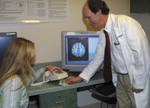MRIs may eventually identify deception
Study finds significant activation in several brain areas during lying compared with truth-tellingA new study involving people telling lies while undergoing functional magnetic resonance imaging (fMRI) provides early indications that understanding the brain basis of deception may lead to a better lie-detection method than polygraph tests.
Researchers found that lying, compared with telling the truth, produces more activation in five brain regions. Results of the study were presented at the 112th Annual Convention of the American Psychological Association (APA) in Honolulu July 28 and published in the August issue of Behavioral Neuroscience, a journal by the APA.
Despite widespread use, mounting evidence suggests that polygraph tests are not an accurate lie detection tool.
The National Science Foundation recently highlighted the need for new methods to identify deception after concluding in a report that the polygraph lacked evidence to support its use in detecting deception.
Researchers say the problem with the polygraph is that it measures peripheral arousal, not deception itself. Blood oxygen level-dependent (BOLD) fMRI, however, may be able to measure brain activity associated with deception.
In a study designed to replicate their previous pilot study, Frank Andrew Kozel, M.D., and colleagues at MUSC and the Ralph H. Johnson Veteran's Affairs Medical Center, studied 10 healthy adults who were told to tell the truth or to lie while being imaged in a magnetic resonance imaging scanner.
 Test
subjects are shown where a $50 bill is hidden. Then while investigators
analyze their brain scan, they are told to lie or tell the truth concerning
the location of the bill. Demonstrating are Dr. Mark George and research
assistant Emily Grenesko.
Test
subjects are shown where a $50 bill is hidden. Then while investigators
analyze their brain scan, they are told to lie or tell the truth concerning
the location of the bill. Demonstrating are Dr. Mark George and research
assistant Emily Grenesko.
Before the scanning began, the participants visited a room in which they were told to locate and leave in place $50 bills that were placed under two of six objects in the room.
During the scanning procedure, the subjects viewed pictures of the six objects from the room just visited and had to indicate by pushing a yes or no button whether money was hidden below the object. Participants were instructed to give truthful and deceptive answers.
Subjects were given an incentive of an additional $50 if one of the researchers could not detect when they were lying.
Results—which were consistent with the pilot study—revealed significant activation of five brain regions during lying compared with truth telling. These areas included the right inferior frontal, right orbitofrontal, right middle frontal, left middle temporal and right anterior cingulated areas.
Several of these regions were identified in other neuroimaging studies as important in cognitive tasks that could be related to deception. These regions could inhibit an overlearned response (the truth), especially in order to gain a reward, according to the researchers.
More research is needed to determine what each of these regions does during lying, such as arousal or response inhibition. While significant group effects were found, the results do not currently support the use of fMRI to detect deception in real world individual cases.
“The study was designed to identify brain regions associated with deceptive answers versus truthful answers, not to formally test the method as a means of lie detection,” Kozel cautions. “Subsequent work will be needed to determine whether this technology can be used to distinguish deceptive responses from truthful responses with individuals.”
Friday, July 23, 2004
Catalyst Online is published weekly, updated
as needed and improved from time to time by the MUSC Office of Public Relations
for the faculty, employees and students of the Medical University of South
Carolina. Catalyst Online editor, Kim Draughn, can be reached at 792-4107
or by email, catalyst@musc.edu. Editorial copy can be submitted to Catalyst
Online and to The Catalyst in print by fax, 792-6723, or by email to petersnd@musc.edu
or catalyst@musc.edu. To place an ad in The Catalyst hardcopy, call Community
Press at 849-1778.